#accattone
Photo
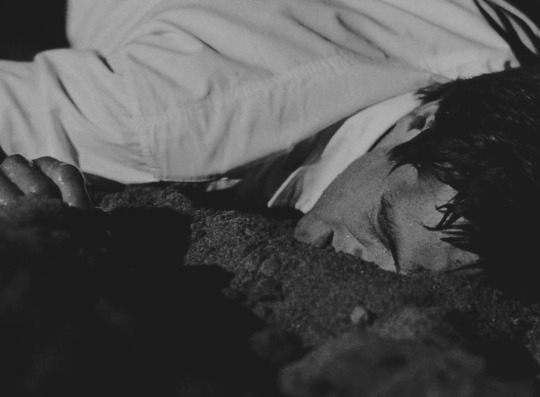


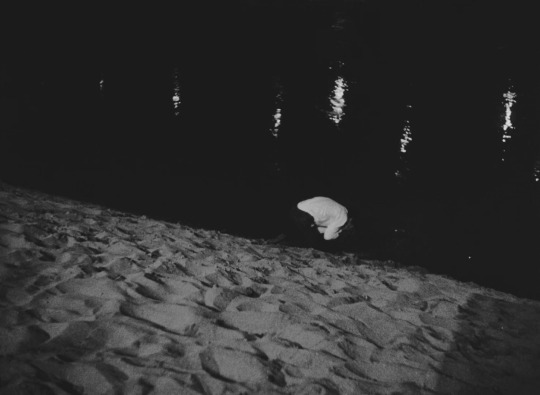

Accattone dir. Pier Paolo Pasolini (1961)
631 notes
·
View notes
Text
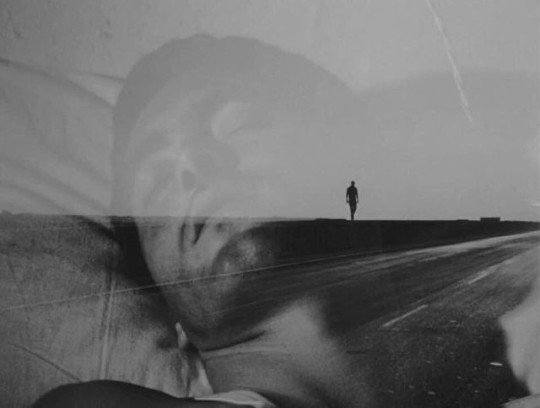
Accattone 1961
Pier Paolo Pasolini
72 notes
·
View notes
Text
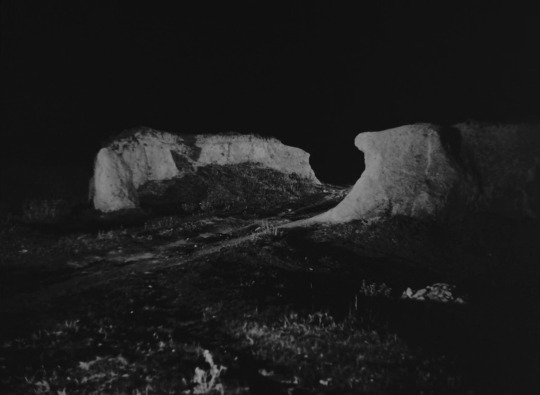


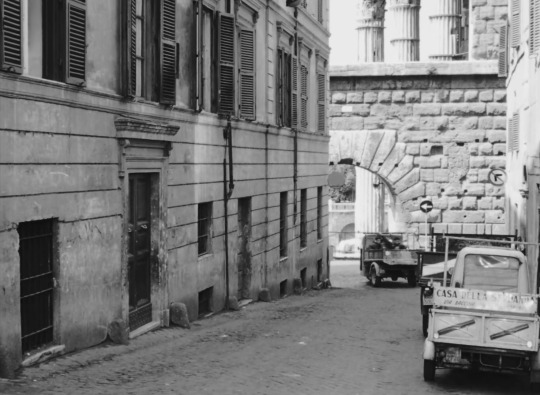
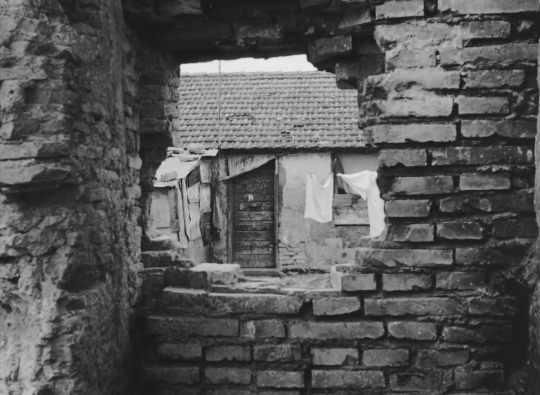


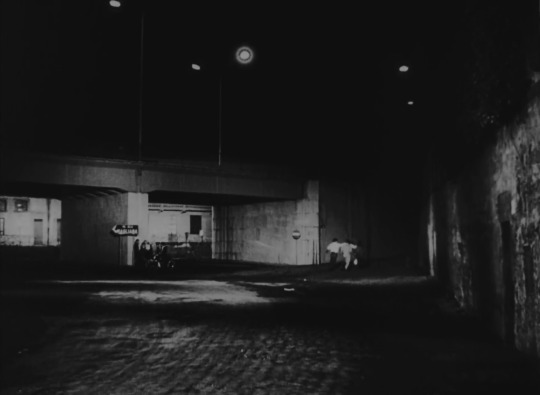
Accattone (1961)
dir. Pier Paolo Pasolini
#Accattone#Pier Paolo Pasolini#Watched this twice now and have found it frustratingly dull both times despite interesting premises#BUT going through looking for caps ruled because it's a very pretty movie
48 notes
·
View notes
Text
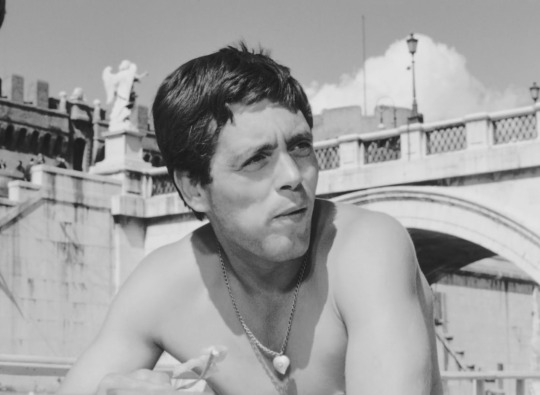
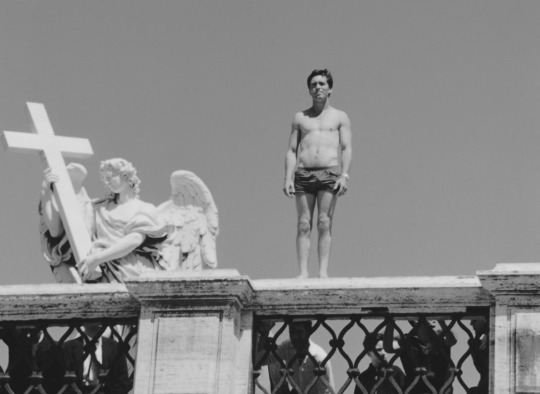


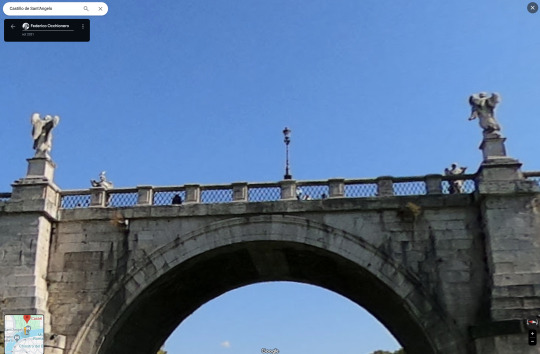
Accattone
Pier Paolo Pasolini. 1961
Ponte Sant'Angelo
Lungotevere Castello, 50, 00193 Roma RM, Italy
See in map
See in imdb
Bonus: also in this location
#pier paolo pasolini#accattone#bridge#rome#diving#ponte sant'angelo#lazio#italy#franco citti#movie#cinema#film#location#google maps#street view#1961#bonus
25 notes
·
View notes
Text

Accattone 1961
Pier Paolo Pasolini
24 notes
·
View notes
Photo

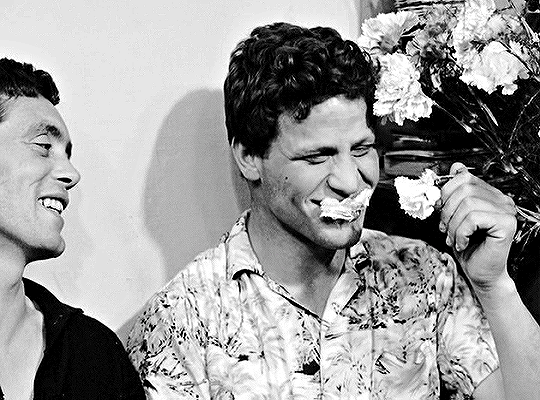

Franco Citti and Roberto Giovannoni
in Accattone (1961) dir. Pier Paolo Pasolini
#Accattone#Pier Paolo Pasolini#Franco Citti#Roberto Giovannoni#guys#flowers#movies#filmedit#*#**#jamesshigeta#usertom#userkeanu#usergina#useralex#userdeforest#ritahayworrth#userjonah#🥰
967 notes
·
View notes
Photo

“I believe in Pasolini the filmmaker almighty … creator of Salo and Mamma Roma … who was conceived by Marx … born of the future spirit of Maria Callas … suffered under the Catholic church … was assassinated and buried unguilty … blessed art thou amongst directors and blessed is the root of thy doomed Jesus … Pasolini will answer our prayers, every single one of them!”
/ From Prayer to Pasolini by John Waters /
Born on this day 101 years ago: doomed highly politicized radical Italian queer filmmaker and poet Pier Paolo Pasolini (5 March 1922 - 2 November 1975). The visionary Pasolini’s films like Accattone (1961), Mamma Roma (1962) and Teorema (1968) are sacred texts in European art cinema. I recommend everyone pick up a particularly rough Italian rent boy today in Pasolini’s memory (at your own risk!) and listen to spoken word piece Prayer to Pasolini (2021) by ultra-fan / disciple John Waters on Spotify.
#pier paolo pasolini#john waters#visionary#lgbtq#queer#italian cinema#european art cinema#radical#doomed#salo#mamma roma#accattone#teorema#prayer to pasolini
129 notes
·
View notes
Text

Accattone - Pier Paolo Pasolini - 1961 - Italy
73 notes
·
View notes
Photo





On the location in Rome of a scene from the movie "Accattone" (1961) by the legendary Italian director Pier Paolo Pasolini!
#pasolini#ppp#accattone#trastevere#roma#rome#italia#italy#cinema#film#movie#lucacaserta#filmmaking#filmmaker
40 notes
·
View notes
Text
Accattone (1961)

A subset of postwar Italian cinema is defined by listlessness. Yet whereas something like Fellini’s Il bidone still finds rambunctious frivolity in these layabouts and ne’er-do-well youths, Pier Paolo Pasolini’s feature debut (how!?) looks at a blasted Rome with a bitter gaze. Aside from some tongue-in-cheek gallows humor of the opening scene, all laughter in this film is a scream into the void. Accattone’s posse laugh to keep from crying over a man mock-eating flowers as they starve, waiting for a meager plate of pasta to serve eight to finish cooking. Joining up with the local thief Balilla to earn a few lira, Accattone and the boss swap jabs at how bad henchman Cartagine’s feet smell because he hasn’t washed in a long time. Everyone laughs too hard, on the edge of hysterics. This small drama plays out in an outer Rome which resembles a trash heap: crumbling buildings dot neighborhoods, rubble litters the streets, and bottles that girls clean to earn some cash are stacked everywhere. The police exist to harass some people arbitrarily, miscarry justice, and pack away people seeking money illicitly because they feel there is no alternative. Spying on his estranged partner Ascenza, Accattone looks at her family through a hole in the wall of a derelict building: Roman ruins, but of a less storied chapter in Italian history than produced the Coliseum. And when one of Accattone’s associates prays mockingly to whatever patron saint may exist for starvation, the camera tilts reverently upward but only finds a blank and anonymous structure. These people have been abandoned in one sense or other.
But despite these tragedies, make no mistake: Accattone is a rat bastard. He decries all gainful employment, abuses the women in his life, and claims that forcing them to work as prostitutes is his own work. Money is always squandered whenever he has it, and lamented when he doesn’t. As with others, he is disillusioned by the world around him, and he’s chosen to lash out in blind rage at all for it. His cruelty is apparent in twin tracking shots in which he pursues first Ascenza and then Stella, his new victim. They move toward the camera, this choice making him inescapable, and similar dynamics play out, if the aggression is at different temperatures. In portraying both his central character and the situation at large in alternately sympathetic and horrified manners, Pasolini indicts everything about this situation.
THE RULES
SIP
A Bach piece starts to play.
Someone makes a bet.
Someone starts to sing.
BIG DRINK
Someone says they are ruined.
A section of Rome is named.
4 notes
·
View notes
Text
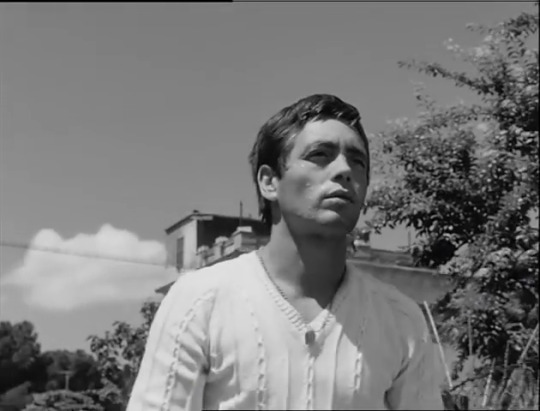
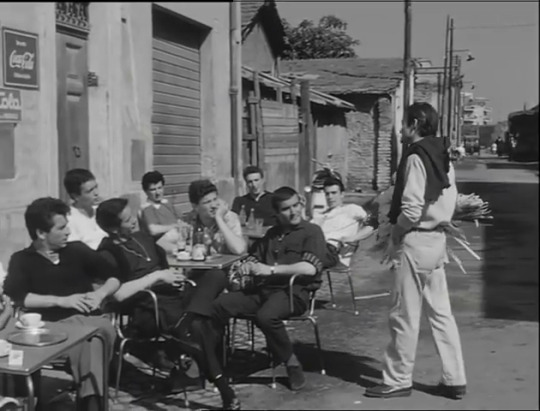

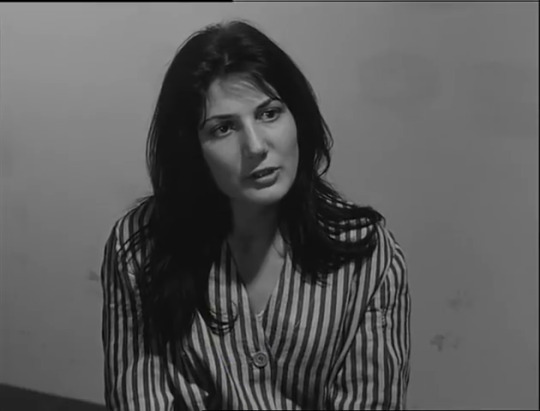


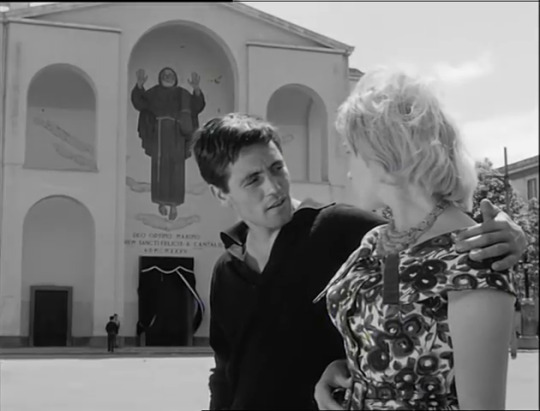
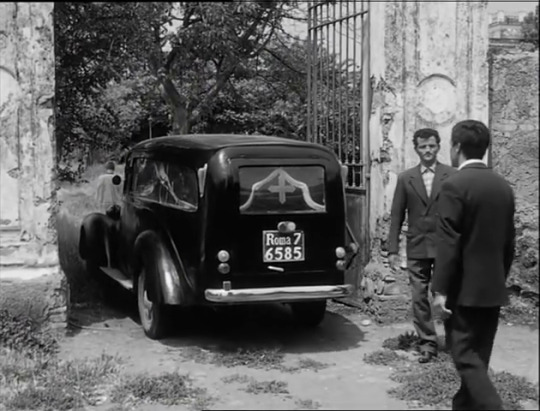
3 notes
·
View notes
Text
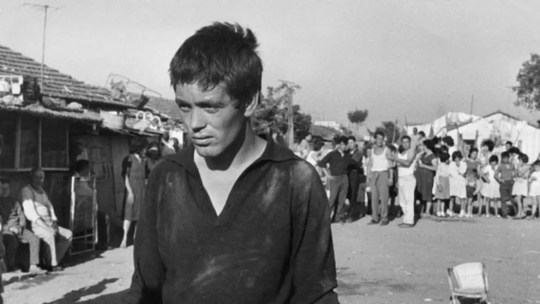
"Accattone", di Pierpaolo Pasolini, Ita, 1962.
..."Dunque, Accattone è un rimasuglio della Storia, destinato a scomparire, come le tante situazioni funeree del film sembrano indicare"...
2 notes
·
View notes
Text








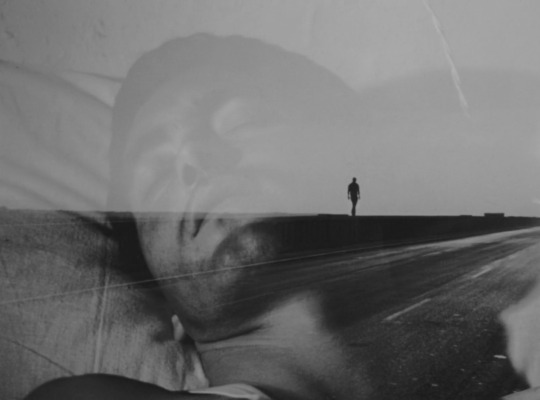
Accattone (1961) dir. Pier Paolo Pasolini
38 notes
·
View notes
Text
CC's New Watch Ranking - May 2023

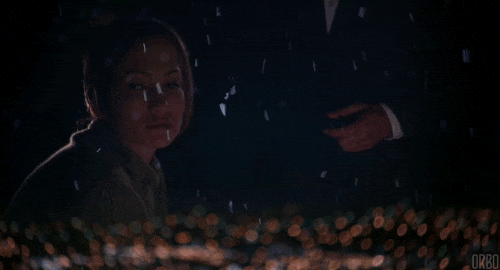
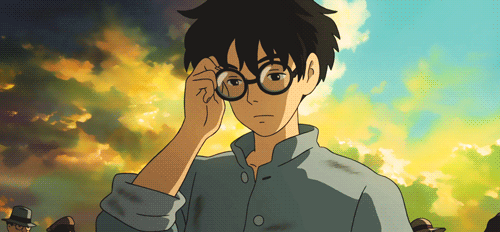
Every month on Letterboxd, I make a list of the 10 best films I’ve seen for the first time. It’s a fun way to compare movies separated in time, genre, and country of origin, and helps me keep track of what I’m watching! This is a breakdown of those films.
May! An honored month in my household as my partner enters her time of astrological power. Taurus would have us laze around in the sun enjoying life’s hedonisms, but I’ve been resisting that call and working like a madperson instead. I got cast in a movie! Only a background role, but it’s been an incredible learning experience. You can watch a ton of films (and reader, I have) but nothing will teach you quite like being there. Being able to watch it all unfold before your very eyes? Fascinating. Besides that, Tears of the Kingdom has been occupying my time. I love throwing that twink off a cliff. He soars just right. The protagonist of one of this month’s films would be delighted to see him fly.
Click below to read the breakdown! Click HERE to view the list on Letterboxd!
10. Accattone
1961 - Pier Paolo Pasolini
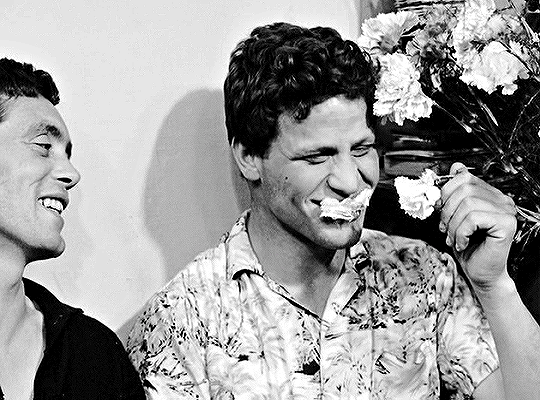
I watched many films by Pasolini this month. He’s one of the most interesting figures in Italian cinematic history, an openly gay marxist who stood up for ideals that were on the extreme fringe of the culture he was working in at the time. His career was tragically short-lived, cut short by either political assassination or extortive murder, depending on who you believe. Wild that it was films like this that made him the target of such ire. The story is so basic, so familiar: A horrible man is horrible to those closest to him. They suffer; he suffers; eventually, he is killed as a result of his horrible decision making. That tagline calls this “The poor man’s Dolce Vita?” While shot beautifully and containing some compelling moments, I don’t find this nearly as interesting as the other works in Pasolini’s filmography. It was made for a very specific time, and I think if you’re not plugged into the particulars of Italian class and gender dynamics, this just read as typical criminal melodrama. It is funny that Accatone’s criminal career culminates in an attempted salami heist. He and my cat have a lot in common.
9. Othello
1951 - Orson Welles

Any adaptation of this text is going to bear a ton of baggage. An adaptation made in the 1950s especially. But my main criticism of this film is that it represents a style of Shakespearean performance that I find dated and boring. It’s so stagey - which is a ludicrous complaint given the nature of the work and the sorts of movies I love. But this is false-stagey, containing people making proclamations and japes, without any human emotion behind the vast majority of their lines. It’s a shame, because this is one of the most beautifully shot Shakespeares I’ve ever seen. They gain so much by shooting in Venice, and using the striking contrast of light and shadow that Welles is famous for. That just barely sustained my interest through an otherwise flat adaptation. Maybe it’s just the bias of the time I’m viewing this in - I prefer a much more psychologically rich take on the Bard’s work, rather than a bunch of people wearing tin crowns and signing towards medieval behaviors.
I watched this with my cat. She sat in a chair next to mine and seemed engrossed. Add this to the “BirdTV 10+ Hours Nature Noises for Cats” rotation.
8. Shanghai Express
1932 - Josef von Sternberg

I’ve been reading a ton of Agatha Christie lately. This movie, made around the same time as many of Christie’s best works, evokes so much of the era: the glamor, the manners, the ignorance of how the world will change in a few short years, the omnipresent racial caste system. It’s so amusing to read Christie’s work when you hold the knowledge of how the world is going to change. It’s a similar pleasure watching this movie - these wealthy colonizers are passing through a China that will no longer exist, whose trajectory for the rest of the century is going to be a reaction to their actions and attitudes. How peculiar that the center of this film, then, should be Marlene Dietrich and Anna May Wong, two figures who defy all the trends and assumptions one would make about this era. Their sapphic attachment bubbles under the surface of all their scenes. It motivates a movie that would otherwise be heavy-handed and patronizing. While it has its problems, I’d still recommend this to anyone who wants to see some of old Hollywood’s biggest queer icons working at the height of their power.
7. Theorem
1968 - Pier Paolo Pasolini
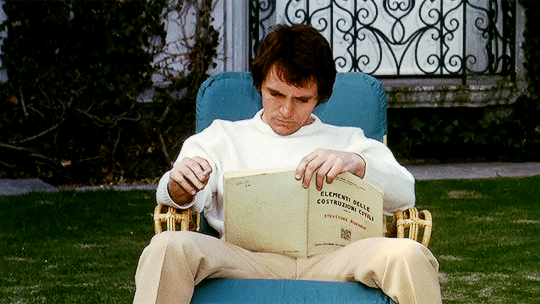
Where Accattone looks at the urban working-class folks who live their lives by petty crime, Teorema is concerned with a more provincial elite. I kept thinking of the wannabe literati that I grew up with - boys who read Freud too young and were convinced that this coked-up Austrian held the secrets to the universe. Boys who would lean in at random points in a discussion to say “Well, this really comes back to Oedipus, doesn’t it?” As with Accattone, I think this is speaking to a specific time and place so succinctly that it won’t work for people outside that bubble. A young man basically wanders into a rich family’s home and sleeps with all of them. Through different situations and personas, he gets to each of their psychosexual cores. The most remarkable scene is the exact middle of the film. In the wake of all these sexual encounters, each family member basically addresses the fourth wall and states what this intimacy will do to them. “I will be forever changed; the shadow of this sex will live in my heart forever.” The rest of the film proceeds exactly as they predict. There are some incredible, surreal images bound up in the action, and I enjoyed watching it, but overall there are too many messy edges and pseudointellectual implications for me to heartily recommend this to everyone. Maybe once I’ve completed this mog I’ll see this film in a new light.
6. Face/Off
1997 - John Woo

Oh man, this is the polar opposite of the navel-gazing art house nonsense of the Teorema. Simple premise: What if Nic Cage and John Travolta swapped faces? Wouldn’t that be fucked up? A thoroughly enjoyable 90s action flick without much beneath the surface besides satisfying action. (Though, on reflection, this film also has a bit of incestuous implication - Cage-Wearing-Travolta flirts with Travolta’s daughter, and she seems to reciprocate? They drop that plot beat quickly, but it is uh, awkward to say the least.) While this wasn’t quite the exceptional genre entry some people had told me it was, I still had a blast watching two of Hollywood’s weirdest actors get a chance to imitate each other’s energy. They do it perfectly. Really makes you appreciate the way a person can truly transform within a performance
5. Mamma Roma
1962 - Pier Paolo Pasolini

I’ve preferred Pasolini when he’s plugged into *some* degree of realness. As a director who lived through the neorealist era, and was once a close collaborator with Fellini, I feel like his work really shines when he accentuates a grounded reality with just a touch of dream-logic. This happens brilliantly within this film. A middle-aged woman has earned enough through sex work to purchase a fruit stand, and uses this entry into “respectable” life as an excuse to reconnect with her estranged son. But she finds it difficult to shake off all the ghosts of her past. She cannot just snap her fingers and have the life she dreamed of decades ago when she gave her son away. He has grown into his own person, and struggles under the weight of her dream as he tries to pursue his own. It’s a wonderful, messy tangle of competing desires, fantasies, and realities. The extreme highlight of this is two separate oners that take place late at night, during her time as a sex worker. Wandering through these pitch-black streets with only strong, skinny street lights to illuminate the scene, Pasolini follows Anna Magnani with a handicam type-setup, following her as she has a continuous monologue with several passersby. It’s a brilliant shot by Tonino Delli Colli who would later go on to shoot The Good, The Bad, and The Ugly. The dreamlike, anchorless way she walks through this void reflects how disconnected she is from her own life. She does sex work, but does her best to forget it - she holds some standard for herself that is based in a society that despises her, yet loves and adores her at the same time. The happy way she trades jokes between johns and other sex workers, while stumbling through this featureless space… it’s just incredible. Pasolini really did see the tangled web of his society and captured it like no other. It really reflects this social mobility and economic boom after the devastation of World War 2. An entire nation desperate to forget its past, yet unable to do so. Desperate to forge a new middle class while sneering at those who would comprise it.
4. Seven Chances
1925 - Buster Keaton
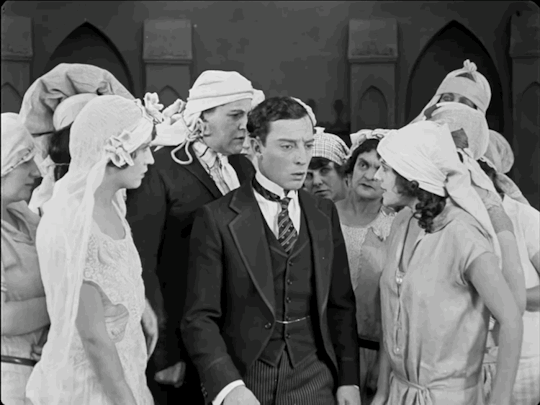
My beloved Blank Check has been covering the films of Buster Keaton, and I’ve been watching along. Buster is one of the geniuses of this medium, whose films remain timeless because of his relentless precision and thoughtful craft. This is one of his best films. Through silly circumstances, a young man learns he has to get married in less than 24 hours in order to inherit a large fortune. There are seven women with whom he could have a chance, and he messes it up with them all. Honestly, the title-to-premise connection is a bit weak, as he made many changes to the source material this film is based on. There’s a lot more rockslides than that plot description would have you believe. Even after nearly a hundred years, this succeeds in getting a real laugh out of me. There are too many jokes packed into each little moment for me to really isolate. It’s just perfect slapstick, perfect physical comedy the whole way through. Put your phone down and drink it in.
3. Europa ’51
1952 - Roberto Rossellini

A devastating film about a woman who changes in the wake of her young child’s suicide. My review on Letterboxd:
“Honestly this is too rich in psychologies, philosophies, and ironies for me to fully understand in one viewing. But I *loved* the transformation Bergman depicts over the course of the film. An incredible performance - going toe-to-toe with Giulietta Masina in one of her best cameos, too! I think this is something I'll be revisiting for years to come.
I write this in the wake of Jordan Neely's murder. It is incredible how mental illness is defined by what causes the slightest annoyance to those in power. We - and by 'we' I mean a specific class that operates our above ability to consent - lock up or kill the people most in need of understanding. Those who really just need positive human connection.”
This film creates an interesting parallel with Mamma Roma. Spoilers ahead: Mamma Roma also has a young boy who kills himself, but indirectly, dying of illness in a prison cell. He’s in prison because he was lashing out, just like the kid in this film was desperately crying for attention. His death was merely more direct, more immediate. These films form an interesting dialogue of similar subject matter, only really changed by the social classes of their protagonists. Mamma Roma longs for the status that Bergman starts with in Europe ‘51. Bergman ends up as shunned as Mamma Roma is at the start of her film. Fascinating examples of the cyclical ways women are demonized, no matter where they begin.
2. Out of Sight
1998 - Steven Soderbergh

What a fun film!!! Soderbergh is one of the best directors working right now, and my, does he work. I can’t think of anyone else who makes movies at the rate he does, and who is involved in so many different projects and genres. His films have wonderful movement and great characters. He’s a natural fit for Elmore Leonard’s writing. Leonard is a mystery to me - I’ve been watching a lot of films based on his stories with some friends, and on paper, they are all very generic tales with boilerplate characters. A female FBI agent who can “keep up with the boys.” A smooth talking criminal with a violent impulse. A charming thief. You’ve probably seen these characters in a million different works and can’t remember a single one of them - yet somehow, Leonard finds the situations and plot beats to make characters like Karen Sisco soar. Sisco is hunting Jack Foley, played by George Clooney in one of his steamiest appearances. He kidnaps her right before she can catch him, and they are forced to have a long conversation together while locked in the trunk of the getaway car. This starts an attraction that supports the rest of the film, filled with many twists and turns as one tries to reunite with the other - to fuck? To kill? To rope into the robbery? It will keep you guessing until the very end. I really love crime thrillers, and it’s no surprise that the director of Ocean’s Eleven is able to work with these incredible characters and craft some amazing scenes. Come for the romance, stay for the heist. Or come for the heist and stay for the romance. Just see it! It’s great!
1. The Wind Rises
2013 - Hayao Miyazaki

I had been holding off watching this for a long, long time. It can be hard to watch a film that you know will devastate you. When I heard Miyazaki had made a film about the act of creation and its futility, how even the best minds with the highest aspirations can lead to terrible destruction… oof. I was afraid of the mirror this film could turn out to be. Its tagline is “We must live” - how devastating is that? My mind goes to the final scene of Uncle Vanya.
The film soared even higher than I could have imagined. Yes, it made me cry, but it also left me feeling more hopeful about the world than I could have hoped for. It follows the life of Jiro Horikoshi, an airplane engineer who lived during the early 20th century and designed some of Imperial Japan’s fighter planes. The film flows seamlessly between his life and his dreams. It’s the perfect subject matter for Miyazaki. You can feel aspects of Miyazaki’s own life bleeding in at the edges - his quest for perfection, his relentless work ethic, the literal machinery that occupies his dreams. An early scene has Jiro speaking to one of his idols in a dream, literally having a sort of psychic communication as they trade notes on plane design. It’s immaculate. Anyone who is a creator has likely had similar conversations playing through their head, dreaming of what their heroes would say if they could read their work. I know I have. As our world faces disaster after disaster, as conflict becomes bloodier and the pursuit of art seems more pointless than ever, works like this reignite my will to keep going. We make the world a little better every time we use our imagination. When we dream, we can envision things as they should be, as they could be, not as they are. It lets us see all the wonderful possibilities that are out there. And if dreams just aren’t enough, remember, there is always love. Fragile, precious, everlasting love, which is immortal even when the people who share it die. This is what makes the wind rise. It’s what gives me hope for the future.
Reader, if you take anything away from this fleeting blog post, let it be the power of dreams and love. They are the best tools we have for fighting evil.
~~~~~~~~~~~~~~~
Thank you for reading! If you liked any of these thoughts feel free to follow me on Letterboxd, where I post reviews and keep meticulous track of every movie I watch. Look forward to more posts like these next month!
#cc oc#movies#film#movie list#monthly ranking#The Wind Rises#Out of Sight#Europa '51#Seven Chances#Mamma Roma#Face/Off#Theorem#Shanghai Express#Othello#Accattone#Pier Paolo Pasolini#Orson Welles#Josef von Sternberg#John Woo#Buster Keaton#Roberto Rossellini#Steven Soderbergh#Hayao Miyazaki
5 notes
·
View notes
Text
la desaparición de las luciérnagas
Pasolini, el poeta, cineasta e intelectual italiano, escribió que la modernidad había arrasado con la pureza de la cultura popular preindustrial. A este proceso lo llamó «la scomparsa delle lucciole» (‘la desaparición de las luciérnagas’) 1. Esta frase se hizo famosa y se utiliza para describir la pérdida de la inocencia y la belleza en el mundo moderno.
La película «Accattone» (1961) fue dirigida por Pasolini y es considerada una obra maestra del cine italiano. La película cuenta la historia de un proxeneta en los suburbios de Roma y es un retrato crudo y realista de la vida en los márgenes de la sociedad italiana.
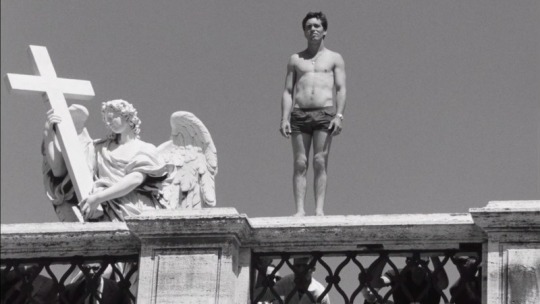
2 notes
·
View notes
Text

Accattone 1961
Pier Paolo Pasolini
11 notes
·
View notes